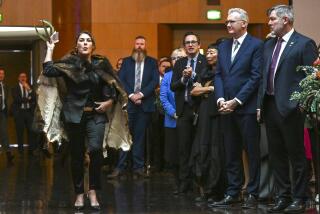Mitterrand Fails to Reconcile New Caledonians
- Share via
NOUMEA, New Caledonia — French President Francois Mitterrand, paying a brief but politically charged visit to this troubled island territory, conferred Saturday with leading supporters and opponents of independence from France, but leaders of both sides later issued statements sharply critical of the Mitterrand government and indicated that his visit had changed nothing.
After spending 12 hours in the South Pacific territory, less than half the time it took him to fly here, Mitterrand left for France insisting that all parties to the dispute agreed that “dialogue” should continue.
However, in a move indicating that the crisis is emerging as a key issue in the political maneuvering before French parliamentary elections next year, senior opposition politicians, including former President Valery Giscard d’Estaing and former Premier Jacques Chirac, will visit the island, according to a Saturday announcement by Jacques Lafleur, the neo-Gaullist deputy to the French Parliament from New Caledonia.
Outpouring of Sentiment Mitterrand’s meetings with the rival New Caledonian leaders, who initially said the talks had been useful, came after he was greeted by a massive outpouring of sentiment against independence. About 30,000 people--approximately half Noumea’s population--demonstrated in the capital in favor of keeping New Caledonia part of the French republic. Mitterrand later flew by helicopter to two towns on New Caledonia’s east coast and visited a local tribe.
While the demonstration was aimed mainly at showing attachment to France, and many in the crowd waved French flags, some demonstrators were openly hostile to Mitterrand and his Socialist government. When a military helicopter brought the French president into Noumea from the airport amid tight security, some in the crowd yelled slogans such as “Mitterrand get out!”
Among the critical banners were some reading, “Mitterrand Traitor” and one that said, “Mitterrand Don’t Sell the South Pacific to the Russians.”
Most of the demonstrators were European settlers, who account for about 37% of the territory’s 145,000 population. However, large numbers of Polynesian and Southeast Asian immigrants also attended. In the minority at the rally were members of the native Melanesian, or Kanak, community, most of which supports independence. The Kanaks, who make up about 43% of New Caledonia’s population, live predominantly in the countryside.
Right-wing opposition parties have accused the government of abandoning its responsibilities in New Caledonia, one of the few remaining outposts of a French colonial empire that once stretched from the Caribbean to the South Pacific. The ruling Socialists have supported a plan to grant the territory independence “in association” with France beginning next January in an apparent attempt to resolve the problem before new elections for the National Assembly.
New Caledonia’s conservative territorial government and its supporters charged that Mitterrand’s Socialist administration is seeking to “abandon” the territory against the will of the majority to the leftist Kanak Socialist National Liberation Front led by Jean-Marie Tjibaou.
In a statement issued Saturday night, the local government was particularly critical of Tjibaou’s departure Saturday on a trip to Australia and France, allegedly with the Mitterrand government’s support.
Shortly after his meeting with Mitterrand, the statement said, Tjibaou was taken by a French military helicopter to New Caledonia’s Tontouta Airport for a flight to Australia, where he is scheduled to meet Foreign Minister Bill Hayden. After a three-day visit to Sydney and Canberra, Tjibaou is scheduled to fly to France to present the case for Kanak independence to various politicians, including conservative opposition figures, Tjibaou’s aides said.
‘This New Maneuver’ The territorial government statement denounced “this new maneuver of the Kanak Socialist National Liberation Front chief who, realizing the great majority of the population rejects him, goes to a foreign country to plead his cause and seek support.” It called on French politicians to refuse to meet Tjibaou.
The vice president and spokesman of the territorial government, Yves Magnier, said the trip was being undertaken with the “complicity” of the Mitterrand government and amounted to “a sort of diplomatic offensive against our government.”
He also accused Paris of “facilitating the actions of a rebel government,” considering that Tjibaou has formed a “provisional” administration of an independent Kanaky, the separatists’ name for New Caledonia.
In a statement released after his departure, Tjibaou denounced the French government for failing to disarm “the reactionary colonialist population” of the territory. His statement, issued in the name of “Kanaky government,” also charged that Paris is “playing a double game,” calling for Kanak participation in discussions while carrying out “a policy of repression exclusively against the Kanak people.”
Since the Kanak front began a campaign of violent agitation in November, about 20 people have been killed, including 14 Kanak militants.
More to Read
Sign up for Essential California
The most important California stories and recommendations in your inbox every morning.
You may occasionally receive promotional content from the Los Angeles Times.













